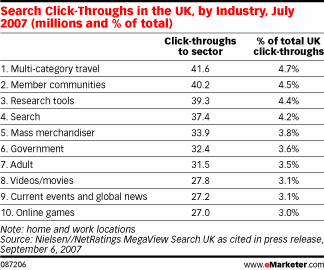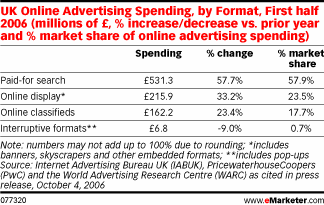"Britons online are most likely to be searching for travel deals, social networks or reference information through sites like Wikipedia and Yahoo! Answers," said Alex Burmaster, European Internet analyst at Nielsen//NetRatings, in a statement.
"Research tools, dominated by Wikipedia, receive around four in every five visitors due to search—not surprising when you consider how often Wikipedia shows up in the first page of Google results," Mr. Burmaster said.

Overall UK search activity mirrors that in the rest of the world. Spending on paid search sites rose from £429 million ($785 million) in 2004 to £768 million ($1,396 million) in 2005, a jump of almost 80%.
The same story emerges when comparing the first half of 2005 with the first half of 2006. Online display and classified advertising spend both increased markedly, up 33.2% and 23.4%, respectively. In the same period, paid-for search listings leapt from £337 million ($613 million) to more than £531 million ($977 million), almost 58% up.
By mid-2006, search-related ads accounted for almost 60% of total online spending, according to one report by the Internet Advertising Bureau UK, World Advertising Research Center and PricewaterhouseCoopers.

The "UK Search Engine Marketing Report 2007" by E-consultancy and Neutralize also detailed growth in paid search ads. Nearly nine in 10 of the study respondents said their company was involved in paid search advertising.
The financial services and travel sectors were the biggest spenders. More than 10% of financial services firms said they spend more than £500,000 ($1 million) annually on search engine marketing, and one company said it spent upward of £1 million ($2 million).
Among travel companies, nearly 11% said they spent more than £500,000 per year, and 25% said they dished out over £1 million.





